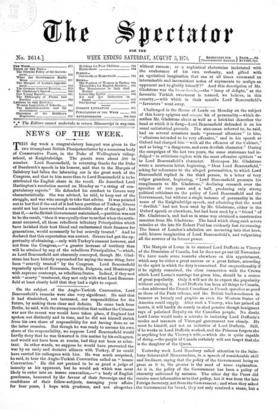Challenged in the House of Lords on Monday on the
subject of this heavy epigram and manque bit of personality—which de- scribes Mr. Gladstone about as well as a brickbat describes the head at which it is flung—Lord Beaconsfield defended it on his usual unhistorical grounds. The statesman referred to, he said, had on several occasions made "personal allusions" to him, "allusions intended to be very offensive," and in his speech at Oxford had charged him "with all the offences of the Cabinet," and as being "a dangerous, and even devilish character." During the campaigns of the last two years, the same statesman had in- dulged " in criticisms replete with the most offensive epithets" as to Lord Beaconsfield's character. Hereupon Mr. Gladstone wrote a courteous letter, beginning, "Dear Lord Beaconsfield," asking for references to the alleged personalities, to which Lord Beaconsfield replied in the third person, in a letter of very vulgar grandeur, beginning, "Lord Beaconsfield presents his compliments to Mr. Gladstone," declining research over the speeches of two years and a half, producing only strong political criticisms on the policy of Lord Beaconsfield and the Government, but without a single instance of personality in the sense of the Knightsbridge speech, and admitting that the word " devilish " bad not been used by Mr. Gladstone, either in the Oxford speech or elsewhere, but had been used by a " friend " of Mr. Gladstone's, and had so in some way obtained a constructive sanction from Mr. Gladstone. The hand which slung such severe missiles at the late Sir Robert Peel has evidently lost its cunning. The fumes of London's adulation are mounting into that keen, cold, bizarre imagination of Lord Beaconsfield's, and vulgarising all the sources of its former power.






























